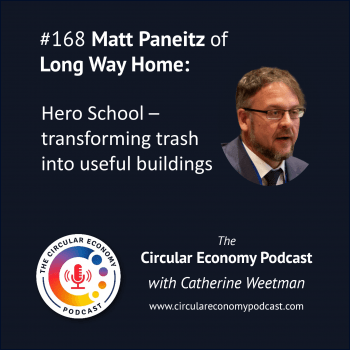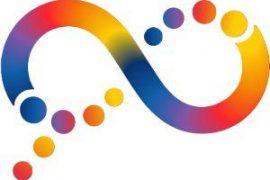Podcast: Play in new window | Download

Long Way Home’s Hero School in Guatemala is a community-rooted educational initiative that transforms local trash into useful buildings. Matthew Paneitz first visited San Juan Comalapa, Guatemala, as a Peace Corps volunteer in 2002, and was deeply affected by this rural, Indigenous Maya community where 64% live in poverty and 27% in extreme poverty. People lacked clean water, reliable sanitation, resilient homes, steady employment, and quality education, and the air, water, and soil are all contaminated by waste and pollution.
Unable to put this out of his mind, Matt returned in 2004 and founded non-profit Long Way Home. One of its major projects is Hero School, a project-based, community-rooted educational initiative grounded in Education for Sustainable Development. Between 2008 to 2025, the Long Way Home team transformed 550 tons of trash (including 35,000 used tires) into the Hero School green-built campus.
Every part of the Hero School campus, from walls made of earth-filled tires and eco bricks to glass mosaics, embodies Long Way Home’s values of environmental stewardship, cultural pride, and resourcefulness.
Matt tells us more about Comalapa and how he started Long Way Home on a shoestring, and takes us behind the scenes for how they began co-creating buildings with the local community.
We hear about some of the unusual approaches to repurposing waste into construction materials, and how Long Way Home is solving multiple problems.
We also learn about some of the unintended consequences – good and not-so-good – and the challenges of funding initiatives like these.
Podcast host Catherine Weetman helps businesses use circular, regenerative and fair solutions to do better, with less.
Stay in touch for free insights and updates…
Read on for more on our guest and links to the people, organisations and other resources we mention.
Links for our guest:
- Long Way Home website https://lwhome.org/
- Long Way Home – open access to building processes documents lwhomegreen.org
- Long Way Home on Facebook https://www.facebook.com/lwhomeorg
- Long Way Home on Instagram https://www.instagram.com/lwhome_org/?hl=en
- Long Way Home on LinkedIn https://www.linkedin.com/company/long-way-home/
- Long Way Home YouTube channel https://www.youtube.com/channel/UCGp4wuyTpyGytkXWSwYX1SA
- Long Way Home 5 min video: https://www.youtube.com/watch?v=v3YDtqVvi08
Books, people and organisations we mentioned
Discount code for 30% off PRE-ORDERS of the new edition of A Circular Economy Handbook direct from the publisher Kogan Page (available in paperback and ebook formats), available worldwide. You can order and use the discount code PUBMON30 at https://www.koganpage.com/CircEcon3 – the code is valid until 2nd November 2025.
Guest bio
Matthew Paneitz first visited San Juan Comalapa, Guatemala, as a Peace Corps volunteer in 2002. To address the extreme poverty in the region, Matt founded the non-profit organization Long Way Home (LWH) in 2004. From 2008 to 2025, the LWH team transformed 550 tons of trash (including 35,000 used tires) into the Hero School green-built campus. Matthew documented the process at lwhomegreen.org. By spending his evenings earning a Bachelor’s degree in Sustainability and a Master’s in Education, Matt was also able to ensure that not only was the landscape transformed, but also the school’s approach to primary, middle, and high school education. Matt is currently a doctoral student in Education at Antioch University.
Long Way Home was founded to confront deeply interconnected challenges in Comalapa, Guatemala, a rural, Indigenous Maya community where 64% live in poverty and 27% in extreme poverty. The residents lack clean water, reliable sanitation, resilient homes, steady employment, and quality education. The air, water, and soil are contaminated.. To address the interconnected crises of abject poverty, poor education, and environmental degradation in Comalapa, Long Way Home launched Hero School, a project-based, community-rooted educational initiative grounded in Education for Sustainable Development. Every part of the Hero School campus, from walls made of earth-filled tires and eco bricks to glass mosaics, embodies our values of environmental stewardship, cultural pride, and resourcefulness. Our approach to education centers on empowering students to become problem-solvers in their communities. Rather than focusing on memorization, our original curriculum integrates hands-on projects into every subject. These projects include ventilated stoves to reduce respiratory infection, water tanks to store rainwater, water filters to purify water, composting latrines to reduce gastrointestinal illness, retaining walls to prevent erosion, and earthquake-resistant homes and classrooms. Through this holistic model, students graduate with more than just a diploma; they gain skills in green construction, teamwork, project planning, and civic engagement. Our teachers, all from Comalapa, undergo continuous training in sustainability and pedagogical innovation, making the entire school ecosystem a learning laboratory. We will soon share our project-based lesson plans with the public schools, and together we will fight poverty, environmental contamination, and injustice on a massive scale.
If you’re new to the circular economy, you might like the ‘getting started’ playlist. There’s also an interactive podcast index, making it easy to find episodes on each of the key circular economy strategies or for a specific market sector. And to dig deeper, please check out Catherine’s award-winning A Circular Economy Handbook, published by Kogan Page.
Please follow the Circular Economy Podcast and let us know what you think on LinkedIn, and if you love this episode, please leave us a review wherever you listen, or send an email…
